Society
Community Organization
Community organising means exciting people to individually and collectively take control of their situation to influence change. In its current strategy, Haki Madini Kenya (HMK) has set out to build organised but informal community entities to sustainably inspire coordinated efforts and
collective action on common goals/agenda in communities where we are present. HMK provide support to communities in the extractives to build their own capacities, share ideas and information, develop the sense of desired change and effectively respond to emerging issues in the extractive sector.
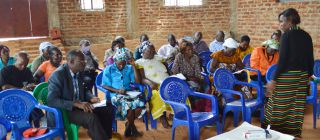
Towards realizing organised extractive communities, Haki Madini has developed a comprehensive guide that provides a clear and replicable formula to assist communities rally and organise in community platforms and build a collective voice on common extractive concerns. The guide is currently being used in Kitui County Mui Coal basin, Kanziko and Ngaie Limestone areas and is soon to be used in other Counties where HMK is present.
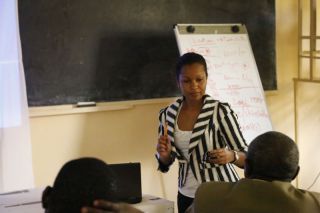
Policies
Policy Advocacy
The sector is regulated by a number of policies, legislative and institutional frameworks, which are not always coherent and in most cases do not address community interests and/or needs nor are they gender sensitive. Moreover, despite the fact that several policies and laws are currently under discussion, crucial legislative frameworks, such as national compensation, benefit sharing as well as relocation/resettlement policies are not in place. On the flip side, important constitutional, policy and legal provisions on land and environmental protection are in place but they lack enforcement and hence harm communities affected by extractive projects and their sources of livelihood.
HMK will monitor closely the development of the policy, legal and institutional framework, inform
affected communities and support them in developing and voicing their positions. This advocacy work demands for action research and strategic partnerships to succeed.
Download CSO Memorandum to Ministry of Mining on Mining Regulations.
Recently done work
- Frequently Asked Questions on Land Access, Compensation, Relocation and Resettlement in the Mineral Resource Sector of Kenya.
- Submission of a written memorandum on the Land Value Index Laws (Amendment) Bill
Obligation
Corporate Accountability
While corporate social responsibility has its place, going forward, it will be critical for civil society organisations working on human rights to focus more on corporate accountability as captured in the letter and spirit of the United Nations Guiding Principles of Business and Human Rights ( hereinafter UNGP) as opposed to corporate social responsibility Commercial interests of extractive companies, especially those operating on large-scale projects, more often than not harm the social, economic and environmental well-being of affected communities.
Moreover, despite the fact that it is very difficult for state actors to regulate corporate behaviour in the era of globalization, Kenya seems to lack the minimum regulations, such as a Code of Conduct for Mining Companies, a formal Corporate Social Responsibility (CSR) framework or standardized local content provisions, that could enhance corporate accountability and responsibility in the sector.
Needless to say, to ensure that the discovery of natural resources in Kenya leads to growth and development and does not become a resource curse, there is a need for increased transparency and accountability in the management of extractive industries. The government, including both the legislature and executive, play a crucial role in shaping and enforcing sound management systems for the country’s newly discovered extractives resources.
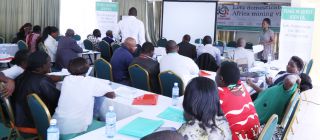
Article 35 of the 2010 Constitution of Kenya provides for “access to information”. More specifically, Art 35 (1) stipulates that “every citizen has the right to access to (a) information held by the State”. Further, Art. 35 (3) states that “the State shall publish and publicize any important information affecting the nation”. There is also the Access to Information Act, 2016 whose object and purpose is to give effect to Art 35 of the Constitution of Kenya.
Against this constitutional background, HMK seeks to support local communities affected by extractive projects as well as the wider public to get access to information about signed mining concessions (licenses & contracts), revenues created (royalties and taxes) as well as revenue distribution and management by the government (national and county level). Further, HMK is committed to supporting local communities to demand for minimum regulations, monitor the activities of extractive companies and hold them accountable for human rights violations (incl. social and economic rights) as well as environmental harms.
Inclusivity
Gender & Extractives
Generally, the extractive sector is largely perceived as a masculine occupation. Women’s participation in the sector is much lower than in other sectors of the economy. Only 9.4% of those employed in the extractive sector are women, while overall women constitute 25% of the wage employment force. The majority of women employed occupy low-skilled positions as well as positions at the lower end of the value chain. While women’s participation in the large-scale extractive project is very low, women are in the majority in artisanal and small-scale mining (ASM), accounting for between 40-100% of the workforce.
Women’s involvement in ASM is very risky in terms of health hazards as well as regular income. Moreover, women engaged in ASM have very limited access to lucrative markets as well as to affordable capital that would allow them to buy equipment to add value to their produce. Research also suggests that women are more likely to be exposed to the negative impacts (environmentally & socially) of the sector. In the compensation & resettlement/relocation processes in the extractives sector, women are highly disadvantaged due to lack of land security tenure and control of other productive assets.

HMK will seek to enhance the capacity of women to participate in decision-making processes at the local and national levels and advocate for gender-responsive policies, compensation, benefit sharing, and resettlement and relocation mechanisms. Women in and around mining areas will be supported to develop an entrepreneurial culture and ‘utilize’ the economic opportunities availed in the sector.
2017

In 2017, Haki Madini made significant strides in making the mining sector a place where both men and women can thrive and benefit in the extractive sector. Gender mainstreaming is a pillar that is integrated into the goal of all the partners within Haki Madini. Groots Kenya were in the forefront of championing women since the onset of their organization. In the beginning of their project, women were discriminated in the mining sites due to cultural beliefs. After consistent engagements and dialogues with men and stakeholders, these discriminations after much-needed addressing have seen a significant decrease.
Groots Kenya observed that after the formation of groups, women have become more active and now a challenge is getting more men to participate. This is due to a lack of commitment from them. Efforts have been realized in trying to understand their challenges and proactive solutions have been put in place to make them comfortable in the groups. One of the solutions to this challenge is holding meetings at the mining sites.
However, they are still on the frontline in mobilizing and building the capacity of women entrepreneurs because in as much as they address issues from both genders women’s income is still at an all-time low. They are still encouraging women to optimize their potential in the
sector.
GROOTS Kenya has ensured that women are involved in decision-making processes. For example, during the elections of artisanal and small-scale miners into the Artisanal mining committee at the county level, 2 out of the 3 members elected were women. Women also got a chance to participate in the County Integrated Development Plan (CIDP) development process by ensuring that the issues that affect them like health, and environment, are captured in the CIDP.
The National Council of Churches of Kenya (NCCK) Gender mainstreaming was done through the deliberate mobilization of men, women and youth participants in all the project forums. NCCK made contact with the SILK women groups who participated in group-level meetings. In partnership with GROOTS Kenya, 6 women from Migori and Taita-Taveta were trained on women's entrepreneurship. Assessments made during group-level meetings revealed gaps on bookkeeping and leadership which will be strengthened in 2018. With lessons learnt from a Joint monitoring visit in Kakamega, plans will be made for an exchange-learning visit for a few women to learn entrepreneurship skills.
NCCK will strengthen targeted capacity building towards gender issues that have arisen in the course of the two years of implementation also strengthen targeted capacity building towards gender issues that have arisen in the course of the two years of implementation.
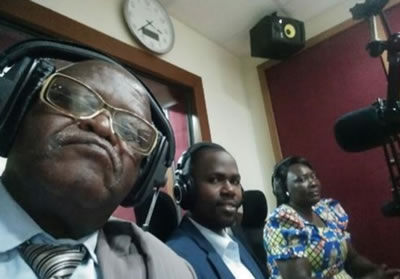
Caritas Kitui set up platforms that deliberately targeted membership from both women and men. The project in the reporting year offered opportunities for both women and men, especially with a focus on women to participate in: radio programs, attend other Haki Madini meetings outside Kitui, to also take part in decision-making levels of the platform through leadership roles. They were also given opportunities for various HMK and partner capacity-building opportunities.
In the radio program, a woman from Kakamega (Groots) was invited to inspire the women in Kitui on how they can strengthen their participation and engagement in the mining agenda.
In one of the short video clips of a community member giving brief story about the change as a result of the Madini Yetu project, one of the women stated:” As a woman, women were left out completely on mining issues. Women also did not know their rights and men really took advantage of this. The men could sell land without engaging their spouse thus bringing conflict and affecting children schooling. But now through Madini Yetu Wajibu Wetu we are now realizing our rights, our responsibilities. The projects have also enabled women to know the minerals that exist, their importance, use, effects and benefits and more so how to use those benefits to improve our livelihoods.”
Knowledge
Institutional Strengthening
HMK’s Strategic Goal 2016 – 2020 is “to enhance the capacity of HMK and communities affected by the extractive sector to engage effectively in national and local decision-making processes on extractive issues and building a broad-based platform for collective action”
The Strategic Objective for Institutional strengthening is to build the coalition as a credible and knowledge-driven entity capable of initiating, catalysing and responding to issues in the extractive sector at the community and national levels. Interventions in this objective focus on the community platforms, the national platform and the secretariat of the coalition.
At the community level, HMK has been establishing community platforms amongst mining communities in target counties. An HMK guide for the establishment of Community Platforms is being piloted in Mui Basin and Kanziku areas of Kitui County which will provide guidance in the rollout of the platforms in the other mining communities. Community Guides have been developed and are being used in enhancing knowledge amongst mining communities through civic education in meetings and through radio. (See Community Guide on Coal Mining and Community Guide on Limestone Mining)
At the National level, HMK convenes National Dialogues on various issues on mining issues. The Dialogues bring together communities in mining areas, duty bearers, CSOs, FBO and other relevant stakeholders in the sector. In 2014, the National Dialogue focussed on responsible
stewardship of the Extractive sector (2014 Conference Report) while the 2015 Dialogue focused on the African mining Vision (2015 Conference Report). Capacity development training and exposure visits on various issues have been conducted for the coalition members and communities.
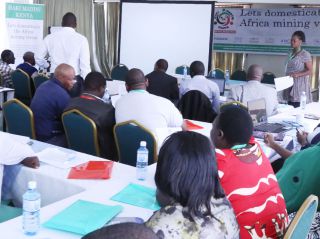
In 2016, HMK convened a joint engagement with 3 other CSO coalitions (KCSOPOG, KOGWG and KENRA) on the Mining Regulations (Joint Memorandum on Mining Regulations).
The HMK secretariat is currently hosted at the Daikonia Kenya Country Office. The Secretariat provides coordination support for the coalition and is currently facilitating the development of vital documents and organisational structures/systems. (The draft SP and Operational Framework)
Key interventions /focus for 2016 – 2020
- Rolling out and strengthening of Community Platforms in at least 6 counties.
- Establishment of a functional Knowledge Management Platform.
- Capacity development of the Community Platforms in the use of new media to advance their issues.
- Capacity strengthening of the National Platform in knowledge and skills for effective engagement (training, exposure visits, etc)
- Action research to inform the coalitions interventions (Compensation and relocation frameworks, benefit sharing mechanisms, human rights impact assessments, local
content analyses/audits. - Organisational development for sustainability (HMK identity, policies, systems and structures, autonomy from host organisation)
- HMK communication and visibility
